- Home
- Matthew Fitzsimmons
Poisonfeather (The Gibson Vaughn Series Book 2) Page 8
Poisonfeather (The Gibson Vaughn Series Book 2) Read online
Page 8
“Ah. So you’re not here to congratulate me on my impending liberation? Damon, I’m disappointed.”
“It’s Agent Ogden. Now sit down and shut up.”
“Don’t be that way. How’s life at the CIA?”
“Sit. Down.”
It came out as a whisper but hit like a roar. Ogden took one step toward Merrick, who dropped quickly into the chair, heart pounding, mouth dry. The agent checked himself, hands clenching and unclenching. Merrick sensed that if he spoke again, Ogden would hurt him. Hurt him badly. Even after eight years in prison, Merrick had never been in a fight, and the prospect scared him. He tried and failed to keep his fear from showing. Ogden sat on the corner of the table, one leg on, one leg off, smiling down at his humiliation. He laid a copy of Finance magazine down on the table.
“You have well and truly screwed the dog, Merrick.”
“It was one interview.”
“You had it made and still shit all over us.”
“One interview.”
“The only interview,” Ogden corrected. He opened a legal-size file folder and slid a contract across the table, spinning it so it faced Merrick. He opened it to the last page.
“This your signature?”
“Yes,” Merrick muttered.
“What’s that? Don’t go getting shy on me now.”
“Yes.”
“Have we lived up to our end?”
Merrick nodded.
“That’s right. We have. Did we let you get sent to a medium-security prison for a hundred fifty years like your pal Bernie Madoff?”
“No.”
“No, we did not. Did we stop Justice from cleaning out that last bank account? The big one?”
“Yes.”
“Yes, we did. And in return, have you lived up to your end? Have you kept that huge oxygen-sucking mouth of yours shut like you agreed?”
“It was one interview, and, well, I didn’t actually say anything.”
Agent Ogden was shaking his head. “No, you didn’t.”
“So what’s the—”
“And that’s the only reason you’re having this friendly chat and not in irons on the way to Leavenworth. Because you didn’t actually say anything. But. But,” Agent Ogden said again like he couldn’t quite believe it. “But you insinuated like a bitch, didn’t you? This nonsense about Chinese puzzles? What were you thinking?”
Merrick saw an opportunity to reassert himself. “You’re being a little operatic, Damon. My lawyer—my actual lawyer—will carve this up. There’s no way you can demonstrate that I said anything damaging.”
Agent Ogden sat back and laughed.
“Lawyer? You live in a fantasy world, white man. Get this through your narrow little head—there are no lawyers. Not anymore. Not for you. This is a national-security issue, which means you are now in the making-Agent-Ogden-happy business. That’s your job. Make me happy. Because if I’m not happy, if I get even the vaguest feeling that you’re getting ready to say something stupid again, I will suspend your civil rights on national-security grounds, I will personally escort you to twenty-three-hour-a-day solitary, and I will see you spend the rest of your natural life there.”
“You can’t do that.”
“See that . . . see that right there?” Agent Ogden pointed a finger in Merrick’s face. “That’s not making me happy. And you’re wrong: I actually can do that. Can and will. What I can’t do is go back to Langley with you doubting what I can and can’t do. You signed an agreement with the government of the United States of America. And more importantly with the Central Intelligence Agency. That deal is unequivocal. And if you jeopardize my operation again, if you interfere with the security interests of this great country, by word or action or even implication, then I will disappear you from the face of the earth.”
The two men sat in silence, but Merrick’s ears rang . . .
Ogden’s operation?
The CIA only had the operation because of Charles Merrick. He’d handed them the veritable keys to the kingdom. If anything, they owed him. A lot more than a stay in a minimum-security prison and the right to keep his own money. They should be building him a monument for what he’d delivered them.
“So what now?” Merrick asked, voice low. He wanted Ogden to think he was afraid of him, and he realized that he was, no act required.
“You have twenty-seven days left before you’re released. Until that time, you will abide by every word of your incredibly generous deal, and then I want you off US soil. We all think that’s for the best.”
“I understand.”
“I assume you’ve made arrangements for your release?”
“I have.”
“Good. Walk me through them.”
Merrick did.
Mostly.
CHAPTER TEN
It was a peculiar thing to feel you knew someone intimately despite never having met. Yet Guo Fa considered himself something of an expert on Charles Merrick, Merrick’s fall from grace being so closely tied to his own. Fa had bought a copy of Finance mostly out of morbid curiosity. Eight years in federal prison had done nothing to dim the arrogance in the man’s eyes in the cover photo, which perhaps explained the audacious madness of the interview. Particularly one specific answer. It had already been a combative interview when the reporter pressed him on how he could be so confident in his investment strategy despite the crash of ’08.
Merrick: Are you familiar with Chinese rings? It’s an ancient puzzle—nine interlocking wire rings on a looped handle. The solution requires hundreds of steps. Before you can hope to complete it, you must understand how the rings interact and affect each other. Not dissimilar to financial markets. When I met my ex-wife, she kept one on her desk. She said she would only go out with me if I solved it.
Finance: And did you?
Merrick: Good lord, no. I took it to an old man in Chinatown and paid him to teach me.
Fa pored over the interview until convinced that he wasn’t simply seeing what he wanted to see. That Merrick had really said it. Well, not said, not explicitly, but it was between the lines—practically a taunt. Of that Fa was certain. He closed the magazine, delicately, as if it were the lid to a box of deadly snakes. A religious man might have prayed for guidance, but Fa sat motionless at his desk, listening to his heart hammer against his chest like a prisoner clawing its way to freedom. He wanted to let out a triumphant yell but stifled the impulse. Chances were, no one would hear. One of the meager benefits of his cramped subbasement-level office was that he could set off fireworks without disturbing anyone. But he was already viewed as an odd duck at the embassy and didn’t dare chance it.
His career hadn’t begun in the subbasement. His descent to this humiliating, windowless tomb had taken years. Each new office less desirable than the last. Each move justified with a reasonable pretext. Fa had accepted each without complaint, as was expected, and could even admire his nemesis’s cruel design.
It could have been worse. Zhi had wanted him transferred to the embassy in Nigeria, but Fa’s family connections had made that politically inexpedient. So Fa had remained in Washington at his plum posting, and Zhi had set to isolating him. Gradually excluding him from meetings, reassigning his workload to others, and moving his office farther and farther to the periphery. At this point, Fa really was, for all intents and purposes, the lowly embassy drone attached to the Ministry of Agriculture that his papers claimed, and not an agent of the Ministry of State Security.
Now thirty-six, Fa saw his younger self with the clarity that only failure brings. Being accepted to the MSS had been the proudest moment of his life, and then, when his first posting had been the embassy in Washington, DC, it had fueled his belief that he was destined for great things. He’d arrived in Washington at twenty-five, a young, idealistic hothead who knew he knew better. Expecting full well to make section head before forty, he’d caught himself mentally redecorating Zhu Zhi’s office.
A sense of personal inevitability can be a dangero
us thing, and Fa had believed that his theory on Charles Merrick would be the key to fast-tracking his career. Government corruption had been a hot-button issue even in 2006, and Fa’s instincts told him that there was more to Charles Merrick’s success than financial genius. Merrick’s first two funds, Merrick I and Merrick II, were simply too staggeringly successful. From 1997 to 2006, his funds’ returns had averaged 28 percent and without a single down year. In Fa’s opinion, no one invested with that kind of accuracy without the benefit of inside information. No one was that good.
So Fa had gone to work, and gradually he’d uncovered the genius of Merrick’s strategy: he never invested directly in China. Anything that blatant would have been spotted by MSS analysts back in ’96, when Merrick Capital’s first fund—Merrick I—launched. No, what Merrick did was so much more sophisticated. Instead, he invested ahead of China. By 1996, the Chinese economy was booming, thanks to the introduction of the special economic zones. GDP grew by almost 10 percent that year alone. Growth fueled by raw materials from all over the world: oil from Angola, bauxite from Indonesia, copper from Chile, tin from Myanmar and Bolivia, and on and on it went. All flowing into the insatiable cauldron of Chinese industry. Yet somehow, with remarkable prescience, Merrick Capital managed to arrive just ahead of major new deals, buying up infrastructure and mineral rights and making a fortune when China’s economic interests became a matter of public record and drove prices sky high.
To Fa, there had been only one possible conclusion—Merrick Capital had a source inside the Chinese government, funneling classified strategic planning to the American businessman. Fa’s intelligence report, based on fourteen months of exhaustive research and analysis, had been unimpeachable. Its conclusions unassailable. Zhu Zhi had seen it otherwise, dismissing Fa’s report on Merrick as the fanciful skywriting of an ambitious young agent whose imagination had gotten the better of him. Fa, in a disgraceful act of youthful arrogance, had attempted to circumvent Zhi and go directly to Zhi’s superior. Circumventing the chain of command in the Ministry of State Security was an unforgivable act of disrespect, and it had been an all-or-nothing play.
Nothing, as it turned out.
Now, because of his arrogance, Fa remained sequestered in Zhi’s bureaucratic limbo, performing demeaning clerical work for the Ministry of Agriculture. Zhi, a genius at torturing his enemies, had recognized that being underutilized would drive Fa mad. As a result, Fa had so few responsibilities that he was always weeks ahead of schedule. In the early days, Fa filled his time reading intelligence briefs, saturating himself with American politics, and keeping current with MSS operations. But as the months turned to years and it dawned on Fa that his banishment was permanent, a lethargic depression had crept into his outlook.
He felt with certainty something that he had never experienced before: that his fate had fallen out of his control. Today, his most realistic ambition was not to be the kind of person found sleeping at his desk in the afternoon. He filled his time with a purgatory of crossword puzzles and online chess. It gave Fa ample time to reflect bitterly on the ruins of his career. He had considered resigning, of course. He missed Shanghai; he missed home. But it would have embarrassed his father, and besides, he wasn’t about to give Zhi the satisfaction. So he sat in his ever more depressing office, did his job, such as it was, and dreamed about his next fishing trip.
Fishing was the one real pleasure he derived from living in America. The rivers here were heaven-sent. And such fish. Fa had fished up and down the East Coast—the Willowemoc Creek, a personal favorite. He’d been fly-fishing in the Blackfoot and Bitterroot Rivers in Montana. Stood waist deep in the frigid Kenai River in Alaska as salmon thicker than his leg surged past him. His next grand excursion would be to Michigan to fish the Fox and Two Hearted Rivers. In preparation, he was rereading Hemingway’s short stories that had made the two rivers famous. These trips were all that had kept him sane during his eight-year exile within the Ministry. In the interim, Fa had forgotten all about Charles Merrick, who ultimately had been arrested by his own government for defrauding his investors of hundreds of millions of dollars.
But now, all these years later, Fa knew that he had been right and Zhi wrong. Merrick’s interview vindicated his theory. But what to do? His responsibility was to take his suspicions directly to Zhi. Unfortunately, Fa knew what Zhi would do. If it turned out now that Fa’s suspicions about Merrick had been correct—about something like this—and it became known that Zhi had suppressed his report . . . it would mean the end of Zhi’s career. Zhi would have no choice but to bury it and Fa with it. For good, this time.
And it would be easy to do, for while Merrick’s interview subtly corroborated Fa’s suspicion, it was far from the smoking gun that Zhi would demand. Merrick was ancient history, and Fa’s theory regarding Merrick’s source in Beijing had never seen the light of day: Zhi had ensured that. Zhi would never endorse Fa’s hunch. It would be an enormous loss of face to admit that Fa had been right all this time. And Fa’s credibility within the Ministry was nonexistent; no one would take his side over Zhi’s, even if he were foolhardy enough to go outside of regular channels again. So what to do? Fa sighed and gathered up his materials. What choice did he have? This was the job. He would take what he had to Zhi, who would summarily reject it, and that would be the end of it. No doubt retribution would follow, but he’d have done his duty; he would sleep with a clear conscience and wait for Zhi’s reprisal.
Fa rode the elevator up to Zhi’s office and considered taking the rest of the afternoon off. Get out of the city before rush hour and go fishing for a few hours to clear his head. A reward for the undignified abuse he was about to receive. It was personal with Zhi, who called him “Fa Gao” behind his back—“the cupcake.” Perhaps he should consider resigning after all. He had served the cause for twelve years; it would not be such a great humiliation for his family now. Would he really sacrifice himself to a losing battle of wills with Zhu Zhi?
Apparently he would.
Fa stuck his head in the antechamber outside Zhi’s office, where Zhi’s secretary worked. When he asked to see Zhi, she masked her surprise with a demure cough—Fa hadn’t met with Zhi in nearly four years. She replied that he would be tied up all day in the weekly operations meeting. Fa had forgotten it was a Monday. A further reminder of his ongoing humiliation, since the operations meeting had once been a staple of his calendar. Fa could guess at the meeting’s agenda. In the last twelve months, directives from Beijing had taken on increasing urgency over uncovering the identity of Zhenniao—the Poisonfeather bird.
Within the MSS, Poisonfeather was the code name for the theory that a series of well-documented leaks to the Americans was, in fact, the work of a mole within the Politburo itself. The theory had been rejected initially for political reasons but also because it lacked a shred of hard evidence. However, an influential cadre within the MSS had stubbornly championed the theory over the last eighteen months, and it was gaining traction within the organization.
Hence Zhi’s obsession with being the one to unmask the traitor. Fa himself thought it highly improbable and considered Poisonfeather an apt name for the Politburo’s hypothetical mole. After all, the Poisonfeather bird was an extinct and likely mythological bird that had supposedly populated southern China until the thirteenth century. Whereas the Politburo’s Poisonfeather bird had come into existence only in 2009. Fa chuckled at his own joke. It was as unlikely as it was . . .
The thought withered as he looked down at Charles Merrick’s magazine cover and felt the chill that sometimes accompanies insight. He did the math, trying to see how closely the chronology matched, oblivious to Zhi’s secretary.
“Fa? Fa!”
He finally heard her calling his name. “Yes?”
“He has ten minutes on Wednesday. At two.”
Fa no longer wanted an appointment with Zhi. If Merrick’s remarks really implied what he now suspected, then Zhi would take credit for it. For the honor to be his, Fa would ne
ed Merrick himself.
What would the old Guo Fa have done? Either take back your life, or you really are a worthless cupcake.
“On second thought,” he told the secretary, “I’ll just put it in an e-mail. I don’t want to waste his time.”
“What about my time? This is an embassy, Fa. I have work to do.”
But Fa was already gone.
Fa’s only friend at the embassy, or rather the only person who remained friendly toward him, was his de facto boss—Wen Bai, the agricultural minister. Wen Bai was either immune or oblivious, Fa wasn’t sure which, to Zhi’s political clout, and as long as Fa got his work done, Bai didn’t meddle in his affairs. He was a plump, congenial man with thick bifocals from another era. Fa found him in his office. His door was, quite literally, always open.
“Fa! Hello there.”
The two men made small talk for a few minutes.
“So what can I do for you?”
“I’m thinking about getting out of town for a few days.”
“Oh, that sounds nice. What about your report?”
“Check your inbox.”
“Oh, very good,” Bai said, reaching for his mouse. “Well, have a good trip, my friend. Where are you headed this time?”
Fa smiled. “I was thinking West Virginia.”
“Big fish?”
“With any luck.”
CHAPTER ELEVEN
Gibson spent two days lying to himself.
He owed the judge that much, since he’d looked him square in the eye and promised not to get involved. A few days of make-believe, pretending that he could live with it. Live with the memory of Hammond Birk cowering in that trailer doorway like a beaten dog. Knowing that the judge would die in that trailer. The man who had saved his life, pushed him to make something of himself, a voice of compassion and wisdom in a chaotic storm, would live out his days in neglect and squalor.
No, he couldn’t live with it.

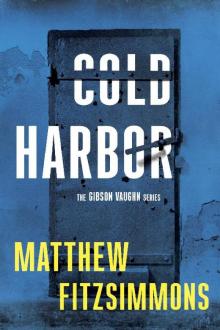 Cold Harbor
Cold Harbor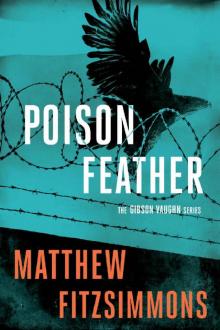 Poisonfeather (The Gibson Vaughn Series Book 2)
Poisonfeather (The Gibson Vaughn Series Book 2)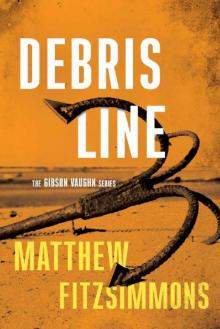 Debris Line (Gibson Vaughn)
Debris Line (Gibson Vaughn)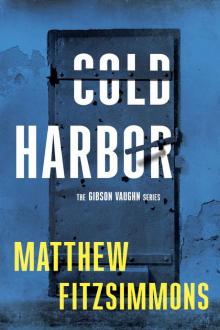 Cold Harbor (The Gibson Vaughn Series Book 3)
Cold Harbor (The Gibson Vaughn Series Book 3)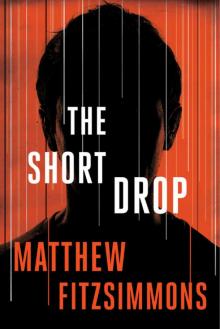 The Short Drop
The Short Drop